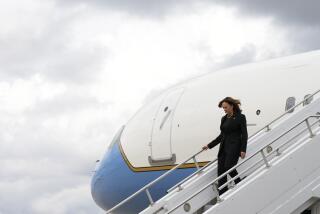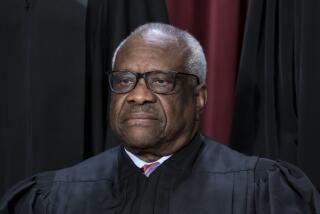Alleged Clinton Lover Talks to House Staff
- Share via
WASHINGTON — Moving beyond the Monica S. Lewinsky case to search for evidence that President Clinton committed perjury and obstructed justice, investigators for the House Judiciary Committee interviewed a Texas woman last month who claimed that she had an affair with the president, officials confirmed Monday.
A committee spokeswoman also reported that investigators had asked the Secret Service for the names of the two agents who were protecting Clinton when he encountered the woman, Dolly Kyle Browning, at a 1994 high school reunion in Hot Springs, Ark.
In Clinton’s Jan. 17 deposition in the Paula Corbin Jones sexual harassment lawsuit--the basis for some of the perjury charges in the impeachment articles against him--he denied having an affair with Browning and disputed her claim that he had cited that relationship during a conversation at the reunion.
Browning, a high school friend of Clinton’s, said in her own deposition for the Jones case that she had a sexual relationship with Clinton for many years.
One Judiciary official would not say whether the Secret Service had complied with the request but added that no agents have been questioned. A panel spokeswoman said that investigators had flown to Hot Springs last month to interview witnesses about Browning’s testimony.
“It should come as no surprise to anyone that the committee has conducted an independent and thorough investigation,” said Judiciary spokeswoman Nicole Nason. “Unfortunately, due to time constraints, we were not able to develop every lead.”
But the revelation of the first thread of undisclosed evidence against Clinton, which Judiciary Majority Counsel David P. Schippers hinted at last week in his summation of the committee’s case for impeachment, has raised questions about whether House Republicans might attempt to use non-Lewinsky material in a Senate impeachment trial.
The disclosure of the Browning interview angered Abbe Lowell, the counsel for the committee’s Democratic minority.
Lowell castigated Schippers and committee Republicans for moving afield to examine allegations about alleged Clinton liaisons that have long been the stuff of tabloid headlines. Lowell also complained that his repeated attempts to establish a joint Republican-Democratic protocol for the investigation had been ignored.
Lowell said that it was “outrageous” for the Republican staff to be investigating issues “not before the committee, meeting secretly behind closed doors, without notice.”
Schippers, who was unavailable for comment, told the committee in his summation last week that his investigators had “uncovered more incidents involving probable direct and deliberate obstructions of justice, witness tampering, perjury and abuse of power.”
He had to abandon those “promising leads,” Schippers explained, because of a December deadline imposed by Judiciary Chairman Henry J. Hyde (R-Ill.) and worries that they might compromise ongoing investigations by independent counsel Kenneth W. Starr.
Some Republican committee members believe that other evidence amassed by Schippers could be used against the president if a House vote sends the matter to the Senate for trial.
Said one Judiciary Republican: “It may well be there’s stuff in there we haven’t dealt with in our inquiry that may buttress” the Lewinsky charges. “The question is,” the member added, “would you want to use the material in [the main case] or in rebuttal?”
Jim Kennedy, spokesman for the White House counsel’s office, criticized the effort.
“If they intend to take partisan steps like this to bolster a trial in the Senate, they will be acting completely outside the framework of the Constitution and would be abusing their power as public servants to usurp the authority invested in the House of Representatives,” Kennedy said.
Constitutional experts are divided over the admissibility of such evidence.
“There’s no constitutional description of evidentiary proceedings in an impeachment,” said Cass R. Sunstein, a professor of law at the University of Chicago who testified before the committee last month.
That constitutional vacuum, Sunstein said, might give Judiciary Republicans leeway in using evidence amassed outside of the Lewinsky matter.
Another recent committee witness, Michael J. Gerhardt, professor of law at the College of William and Mary in Williamsburg, Va., countered that the lack of constitutional precedent would tie impeachment prosecutors to the substance of impeachment articles passed by the Judiciary Committee last week.
The prospect that Schippers’ additional evidence might not be disclosed prompted Browning on Monday to reveal her contacts with Judiciary investigators in a telephone interview with The Times from her home in Dallas.
She said that she had been flown from Dallas to Washington last week by the committee in preparation for testimony that was never taken.
“I did this . . . to prove there was a live witness,” she said.
Committee officials would not respond to Browning’s claims that she had been flown to Washington on Dec. 9--the same day that lawyers for Clinton appeared before the panel. But they acknowledged that Browning was brought to the Capitol last month to speak with investigators. Browning said that she met twice with Schippers and Judiciary staffers, on Nov. 29 and 30.
More to Read
Get the L.A. Times Politics newsletter
Deeply reported insights into legislation, politics and policy from Sacramento, Washington and beyond. In your inbox twice per week.
You may occasionally receive promotional content from the Los Angeles Times.










